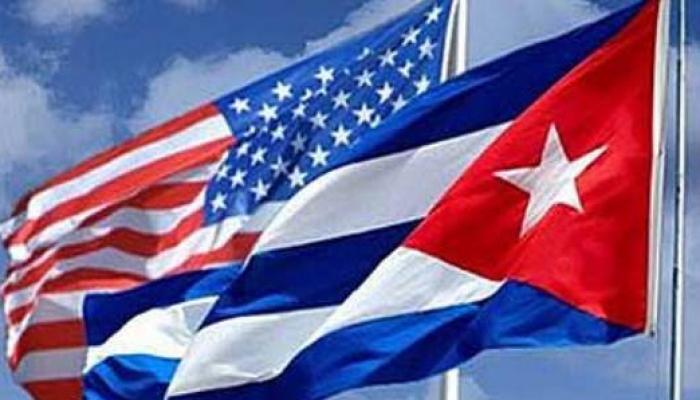Havana, January 12 (RHC)-- Cuba and the U.S. announced today the enforcenment of new migratory regulations as part of the ongoing normalization of relations between the two countries. The new measures include the end of the so call “wet-foot/dry-foot” policy and a medical parole program that encourage Cuban medical personal to migrate.
Here is full text of the joint statement:
MOTIVATED by an interest in the normalization of bilateral relations consistent with the Purposes and Principles enshrined in the Charter of the United Nations, including those related to the sovereign equality of States, settlement of international disputes by peaceful means, respect for the territorial integrity and political independence of States, respect for equal rights and self-determination of peoples, non-interference in the internal affairs of States, and promotion and encouragement of respect for human rights and fundamental freedoms for all;
ENCOURAGED by the re-establishment of diplomatic relations on July 20, 2015 based on mutual respect and the political will to strengthen bilateral relations and establish new understandings in various areas of common interest;
AWARE of the necessity to facilitate regular migration to the benefit of both countries, and to discourage irregular migration;
COMMITTED to preventing irregular migration, impeding departures from the Republic of Cuba that risk loss of human life, combating acts of violence associated with irregular migration, such as trafficking in persons and alien smuggling; and beginning the regular return of Cuban nationals, as set forth in this Joint Statement.
The United States of America and the Republic of Cuba have agreed to take a major step toward the normalization of their migration relations, in order to ensure a regular, safe and orderly migration. The Joint Communiqués dated December 14, 1984 and September 9, 1994 and the Joint Statement of May 2, 1995 remain in effect except as modified by this Joint Statement (collectively known as 'Migration Accords'). This Joint Statement is not intended to modify the Migration Accords with respect to the return of Cuban nationals intercepted at sea by the United States or the return of migrants found to have entered the Guantanamo Naval Base illegally.
In this framework, the United States of America shall henceforth end the special parole policy for Cuban nationals who reach the territory of the United States (commonly referred to as the wet foot-dry foot policy), as well as the parole program for Cuban health care professionals in third countries. The United States shall henceforth apply to all Cuban nationals, consistent with its laws and international norms, the same migration procedures and standards that are applicable to nationals of other countries, as established in this Joint Statement.
1. From the date of this Joint Statement, the United States of America, consistent with its laws and international norms, shall return to the Republic of Cuba, and the Republic of Cuba, consistent with its laws and international norms, shall receive back all Cuban nationals who after the signing of this Joint Statement are found by the competent authorities of the United States to have tried to irregularly enter or remain in that country in violation of United States law. The United States of America and the Republic of Cuba state their intention to promote changes in their respective migration laws to enable fully normalized migration relations to occur between the two countries.
2. The United States of America and the Republic of Cuba shall apply their migration and asylum laws to nationals of the other Party avoiding selective (in other words, discriminatory) criteria and consistent with their international obligations.
3. The United States of America shall continue ensuring legal migration from the Republic of Cuba with a minimum of 20,000 persons annually.
4. The United States of America and the Republic of Cuba, determined to strongly discourage unlawful actions related to irregular migration, shall promote effective bilateral cooperation to prevent and prosecute alien smuggling and other crimes related to migration movements that threaten their national security, including the hijacking of aircraft and vessels.
5. The Republic of Cuba shall accept that individuals included in the list of 2,746 to be returned in accordance with the Joint Communiqué of December 14, 1984, may be replaced by others and returned to Cuba, provided that they are Cuban nationals who departed for the United States of America via the Port of Mariel in 1980 and were found by the competent authorities of the United States to have tried to irregularly enter or remain in that country in violation of United States law. The Parties shall agree on the specific list of these individuals and the procedure for their return.
6. The Republic of Cuba shall consider and decide on a case-by-case basis the return of other Cuban nationals presently in the United States of America who before the signing of this Joint Statement had been found by the competent authorities of the United States to have tried to irregularly enter or remain in that country in violation of United States law. The competent authorities of the United States shall focus on individuals whom the competent authorities have determined to be priorities for return.
As from the date of signing of this Joint Statement, the Parties shall carry out the necessary procedures for its implementation. The Parties may meet and revise such procedures from time to time to ensure effective implementation.
The competent authorities of the United States of America and the Republic of Cuba shall meet on a regular basis to ensure that cooperation under these Migration Accords is carried out in conformity with their respective laws and international obligations. Signed on the 12th day of January, 2017, in Havana, Cuba, in the English and Spanish languages, both texts being equally authentic.


